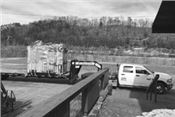|
Renowned Guitar Company Donates Kiln To UK Wood Utilization Center

C .F. Martin & Co. Inc. donated a kiln to UK's Wood Utilization Center. Here, it completes its journey from Nazareth, Pennsylvania to Quicksand, Kentucky.
Photo by Chad Niman
LEXINGTON, KY.
C. F. Martin Co. Inc., maker of world-renowned Martin Guitars, has donated a kiln to University of Kentucky’s Wood Utilization Center in Quicksand. The donation will provide opportunities for instruction, wood-drying research and the center’s ongoing support of Kentucky’s secondary wood industries.
C. F. Martin, one of the oldest acoustic guitar manufacturers in the world, was founded in the United States in 1833. It has been continuously owned and operated by six generations of the Martin family. The company processes rough lumber at their factory in Nazareth, Pennsylvania, and cuts backs, sides and guitar necks for its acoustic instruments. When the company decided to purchase two new kilns with double the capacity, the discussion centered on what to do with their old kiln.
“Typically, when we upgrade machinery, we’ll see if someone wants to buy it or we trade it in. In this case, our president suggested we find someone to donate it to,” said Aaron VanWhy, the company’s wood resource utilization and parts manufacturing manager.
UK Department of Forestry and Natural Resources specialists Chad Niman and Bobby Ammerman met Scott Weikert at a meeting of the Ohio Valley Lumber Drying Association, and a chance conversation led to an important connection. Weikert, a Penn State University extension educator in forest resources, had built a relationship with C. F. Martin through his job and knew the company wanted to donate their kiln for use in education. Niman and Ammerman had been trying to get a kiln for the Wood Utilization Center for some time, but they hadn’t been able to obtain funds to purchase one.
“Our kiln at the wood center was antiquated, ran on diesel and cost a fortune to use,” Niman said.
The serendipitous meeting led to both men visiting Martin’s facility to make sure the kiln would fill their needs in Quicksand.
“They only procure wood from well-managed sustainable forests through programs such as the Forest Stewardship Council. It was amazing to see their commitment to good forest management,” Niman said. “To see the passion that they have for education and wood and doing the right thing – the whole experience thrilled me.”
Manufactured by Brunner-Hildebrand, known as the market leader of timber drying kiln manufacturers, the kiln is about 20 years old. Its chamber is 9 feet by 9 feet by 11 feet tall, and it will hold 1,000 board feet. Not only did C.F. Martin donate the kiln, but they also covered the costs involved in dismantling and shipping it to Quicksand.
“This newer kiln is the right size for us, and it runs on electricity, which will save us money,” Ammerman said. “This creates a lot of opportunities for us.”
The UK Wood Utilization Center is a 14,000 square foot facility that contains an industrial hardwood furniture manufacturing laboratory, classrooms and computer laboratory. It is a component of the College of Agriculture, Food and Environment’s Robinson Center for Appalachian Resource Sustainability. RCARS’s mission is to increase the long-term sustainable income and flow of economic, ecological, and social goods and services from the land, natural resources, and people of Eastern Kentucky and the Appalachian Region.
“Thanks to C.F. Martin’s generosity, we will be one of the very few educational facilities in the country that can harvest unhealthy or damaged trees from our own forest, process that wood into lumber, dry it on site and convert it into a finished product,” Ammerman said.
The folks at C.F. Martin are happy UK will be able to use their kiln.
“We’re glad that the kiln went to a good home. Chris Martin is absolutely thrilled with the outcome of this,” said VanWhy. “It’s great to know it’s going to be put to good use.” ∆
|
|